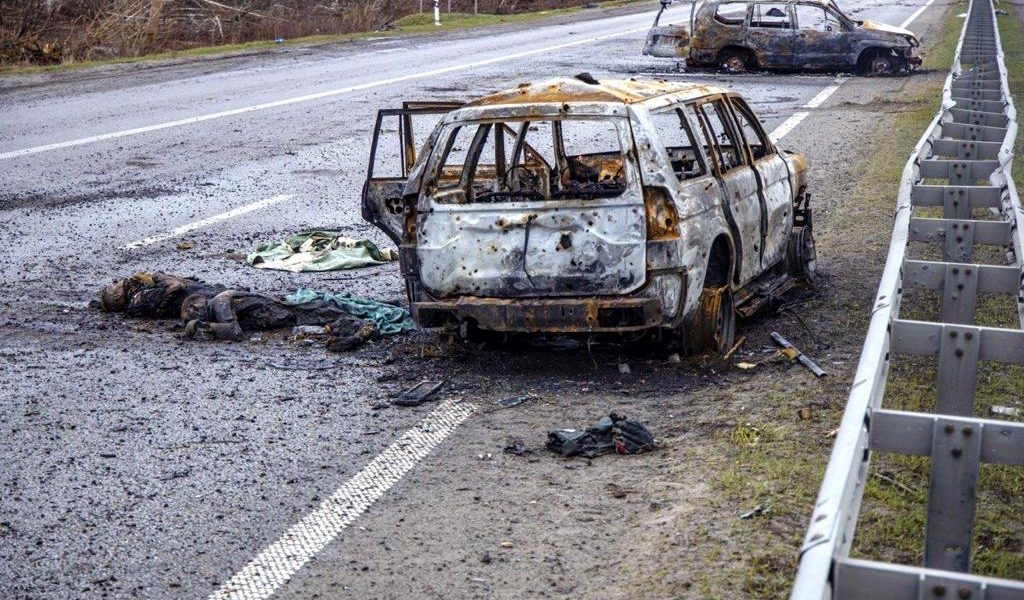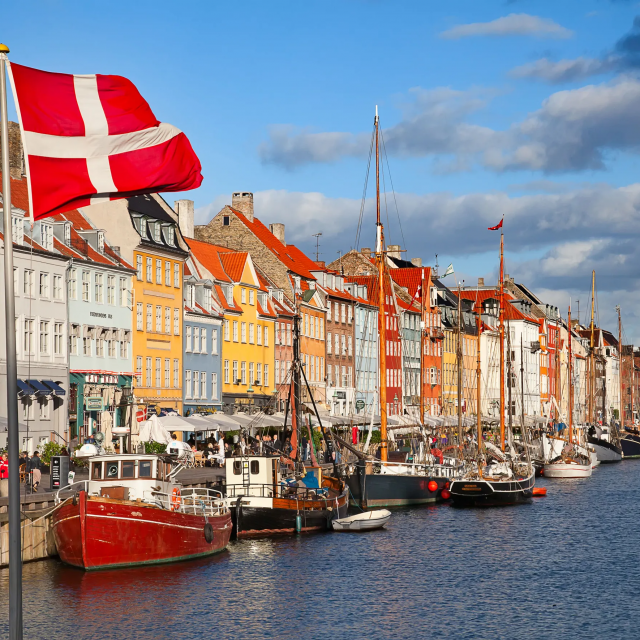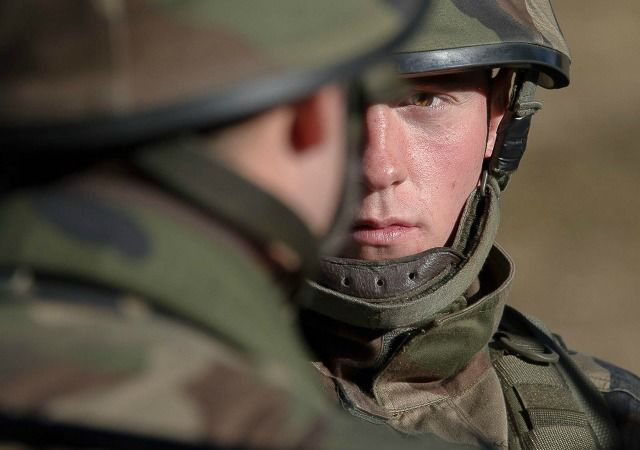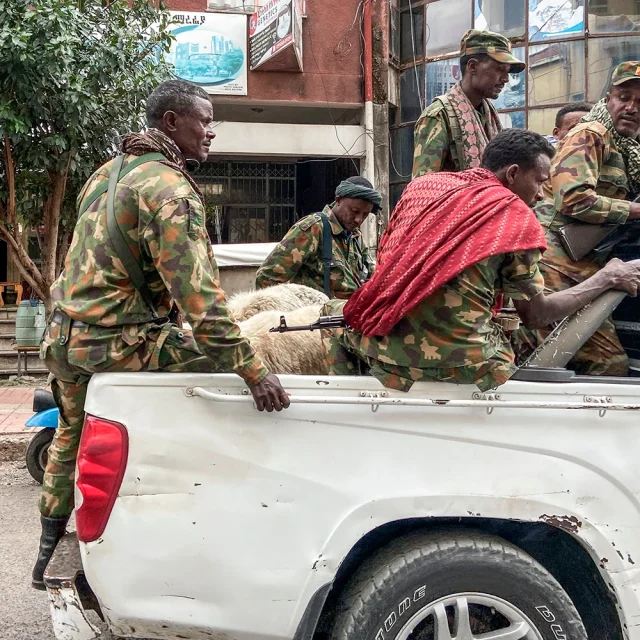24 February 2022 was the first day of Russia’s invasion of Ukraine. The morning that changed the life of every Ukrainian. For many years Russian propaganda tried to change the concept of “war” and its beginning, but the citizens of Ukraine and the world community have long known that a full-scale war was unleashed by Russia in 2014 with the annexation of the Ukrainian Crimea and the occupation of the Donetsk and Luhansk regions, writes Bogdana Bondarenko.
On the morning of 24 February, citizens of Ukraine woke up from explosions in all corners of the country. One by one, Russia launched missile strikes on military, civilian and infrastructure facilities in Ukraine. This day marked the beginning of irreversible world changes, a great struggle and the Ukrainian cities of Bucha, Irpin, Mariupol, Melitopol, Kherson, Kharkiv and many, many others, which are «famous» to the whole world due to the crimes committed by the Russians with particular cruelty.
This is the story of one family from Bucha, whose life was completely destroyed by Russia. Maria Klochko and her brother were born in Bucha, a blooming city located 20 kilometres west of the Ukrainian capital. Mykhailo was 23 years old. The life of this young man has just begun when Russia officially sent troops into Ukraine, and he decided to defend his Motherland from the Russian invaders. Along with Mykhailo, his childhood friend Oleksiy and his uncle Vasyl joined the ranks of the Territorial Defense (a unit that would later be attached to the Armed Forces of Ukraine) to defend his home. All of them died on the same day not far from their hometown.
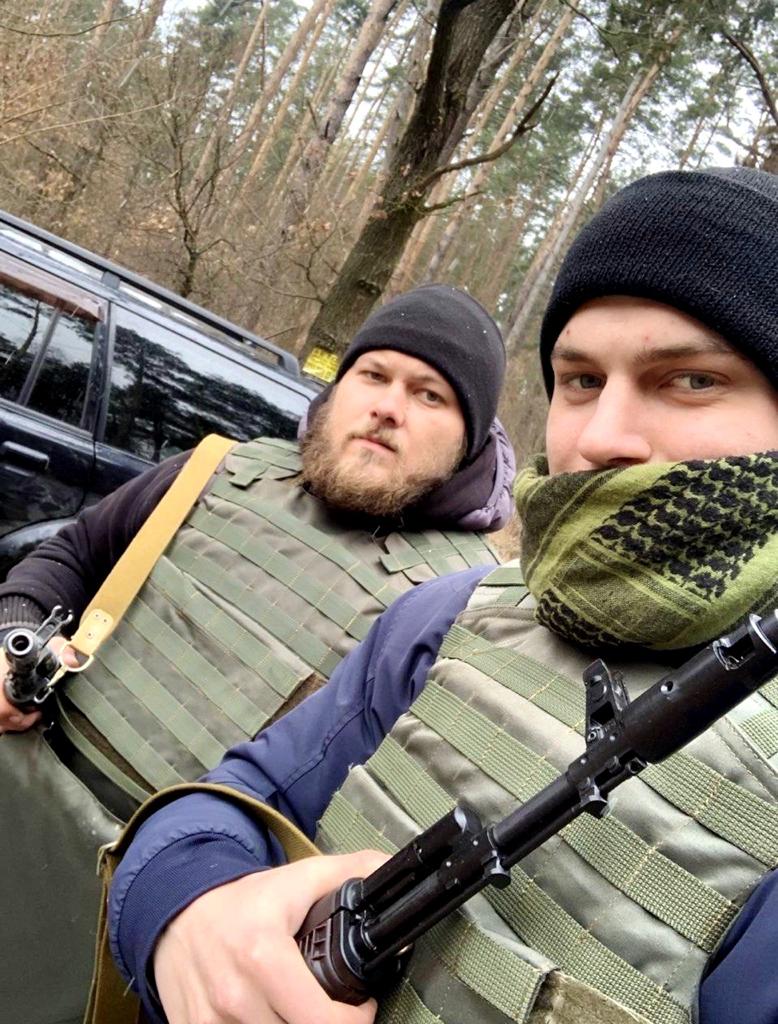
Maria’s brother – Mykhailo and his best friend – Oleksiy
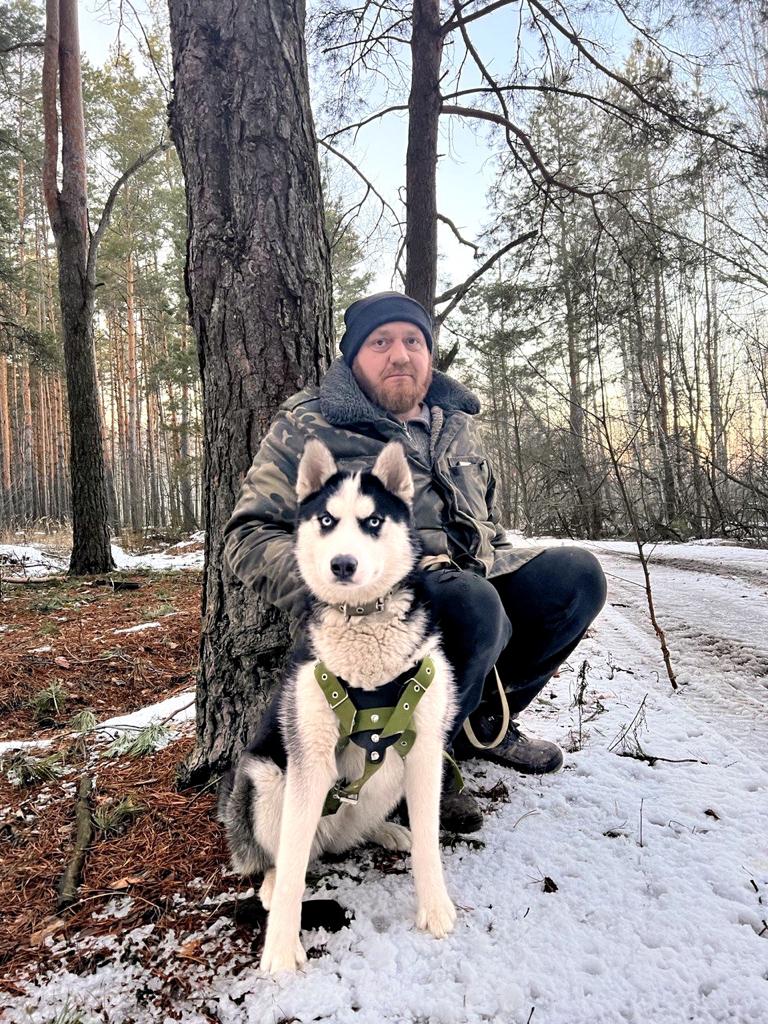
Maria’s Uncle Vasyl
They died on 4 March. Russian soldiers cornered their car and fired at it from all sides with light machine guns. Leaving behind only a pile of metal instead of a car and 2 burnt bodies. His family searched for Mykhailo for а long time. For more than a month, Maria’s family had hope that he might be alive. In captivity or in a hospital, but still alive. Alas, it was only hope.
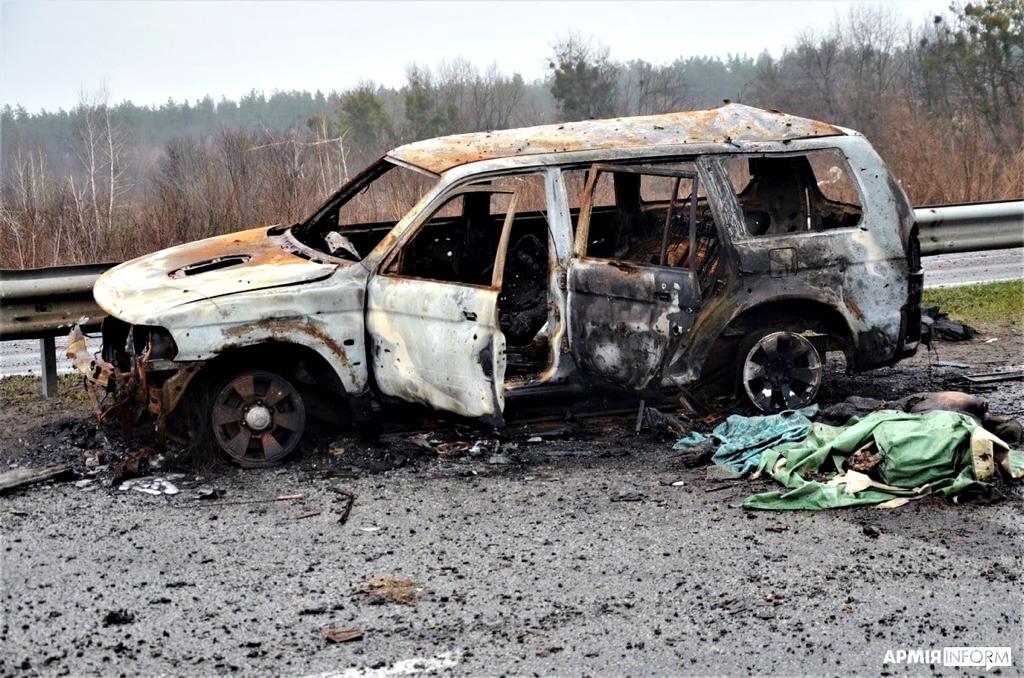
I asked Maria, “How did this war start for you and your family?”
She replied, “My apartment is here, in Bucha, and 20 metres from here is another building, the house of my brother Mykhailo. We lived next to each other, we are cousins, and until the age of 12 we lived in the same apartment. We were very close, best friends. On that day, my grandmother was at my home, she was after a stroke and needed care. That morning, my grandmother woke me up and said: “Get ready, we have to go to your mother’s house. A war started.” To be honest, at first, I thought that the grandmother had dreamed something or that she might have been frightened by some strange sounds. War in the 21st century? We have a developed democracy, such a beautiful country, our society, our people. What a war can be… Until 24 February 24, I didn’t have an emergency suitcase. So, I just grabbed all the papers, my grandmother’s papers and her medicine. She has diabetes and needs medicine every day. But I only take medicine for one day. Because I believe it won’t last long…”
That day, Maria and her whole family left the city of Bucha and went to the neighbouring village where her grandmother lived. Her brother Mykhailo and uncle Vasyl joined the ranks of the territorial defense forces the next day and received weapons. Protect the city and the country was their manly duty. This was not the first time for her family: back in 2014, Vasyl volunteered for the Eastern Front, when the Russians annexed part of the Donetsk and Luhansk regions. Even then he understood that the Russians must be stopped at any cost.
In this village, Maria and her family, without their men, were under Russian occupation for several difficult weeks.
She explained, “…living under occupation is incredibly difficult. Because every day you wake up and do not understand what awaits you next. You have no future. And life under the Russian occupation is a constant lack of food, which the Russian military took from the population, it is a lack of water, lack of electricity and mobile connection. Streets were empty, because people were afraid to leave their houses in order not to be shot in their own home. Already on March 8, there was nothing to eat, the store shelves were empty… The Russians simply interfered in our lives – brazenly, cynically. I was 22 years old during the occupation, I had the impression that this was the end…When you go to sleep not in bed, in the corridor, on the floor, because it’s safer and you don’t know if you’ll wake up tomorrow. When you sleep in your clothes, just to be ready to run outside at any moment, if a rocket hits the house, you will not die under the rubble and also because you are cold, constant cold. But the worst thing that I had to experience every day is the fear that the next day will come and only you will wake up…”
On 4 March, Maria contacted the boys for the last time. At the very beginning, before leaving to defend their home, they agreed to contact each other every three hours by any message application so that Maria and her family knew that the boys were alive. That morning, she received the last text message: “Everything is ok.” But after three hours, and three more without any response, she already felt that something had happened. None of them called that day and would never call again.
Maria explained, “I found out about them at the end of March… I searched for them for a long time: on all search sites, in all Telegram channels. I called the hotlines for searching for the captured, released, shot, wounded. Every day I called hospitals and morgues. I heard one answer: “we are looking for, they are not there.” I looked for them everywhere. And one day I was told that they might have been found. By that time, the Ukrainian army had already expelled the occupiers from the Kyiv region and began collecting the bodies of dead soldiers and civilians. Later, friends sent me photos and videos showing 2 bodies next to a burned-out car… Everything indicated that it was them. Their car, the green scarf of Mykhailo’s friend Oleksiy and two bodies…mutilated, shot, burned. But my brother was not in the photo. There was hope that my brother Mykhailo was alive, that he was left at a checkpoint, in a military unit, wherever. But he is not there, not with them.”
Maria understood that the two bodies near the burned car in the photo were her uncle Vasyl and Oleksiy. But her brain refused to accept this reality.
Later she received the results of a DNA test. She went on to recount “…a lot of things indicated that it was true. And then, when all was confirmed, there was nowhere to escape from the truth. Misha was also there, next to them. The remains of his body were found in the car. His body burned to the ground. The examination confirmed this… It is an indescribable pain, the pain of the loss of your loved ones. We celebrated all holidays together, shared all troubles together, we were a friendly family. And there are many such families in Ukraine. It’s pain, it’s emptiness, it’s despair. These are wounds… wounds that will never heal…”
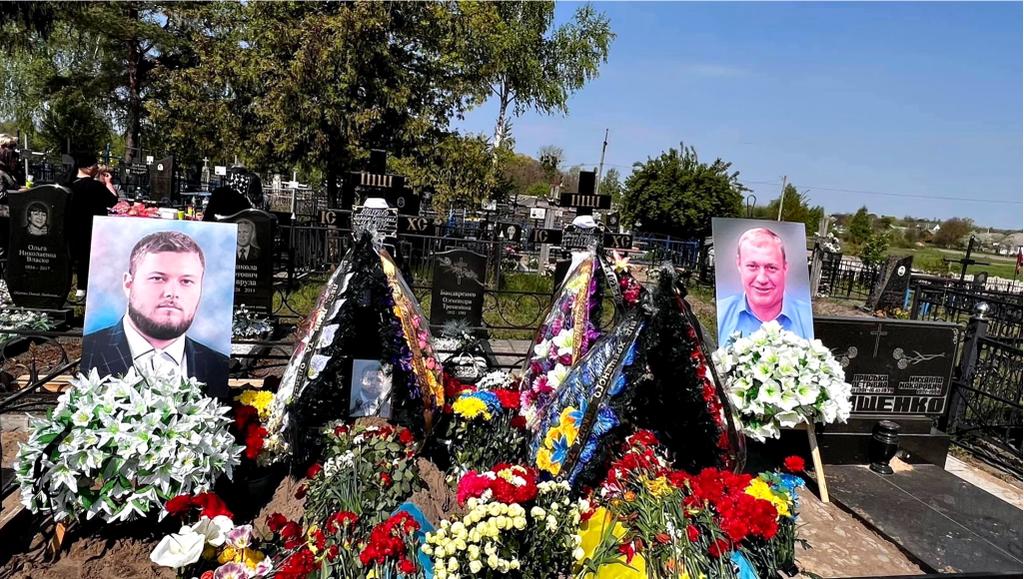
Mykhailo was only 23 years old. This is the age when everything is in front of you and all the doors are open for you. He was always the soul in any company, loved to travel and just opened a veterinary clinic.
Vasyl worked as a forester, his old mother was waiting for him at home, whom he looked after. He was companionate and often gathered the whole family for a picnic in the woods, not far from home.
None of them managed to start a family and give birth to children. All that they left behind are two faithful dogs that are still waiting for their owners. Dogs are the only memory left in the family from their men.
The day of the death of these two defenders of Ukraine was only the beginning of Russia’s brutal invasion of Ukraine and the attempted genocide of the Ukrainian people. It was only day 9 of Russia’s war. Since then another 255 days have passed. This is just one historical record of the thousands of atrocities committed by the fascist Russian invaders of Ukraine.
The Author, Bogdana Bondarenko, is a special correspondent for EU Political Report, based in Ukraine.

